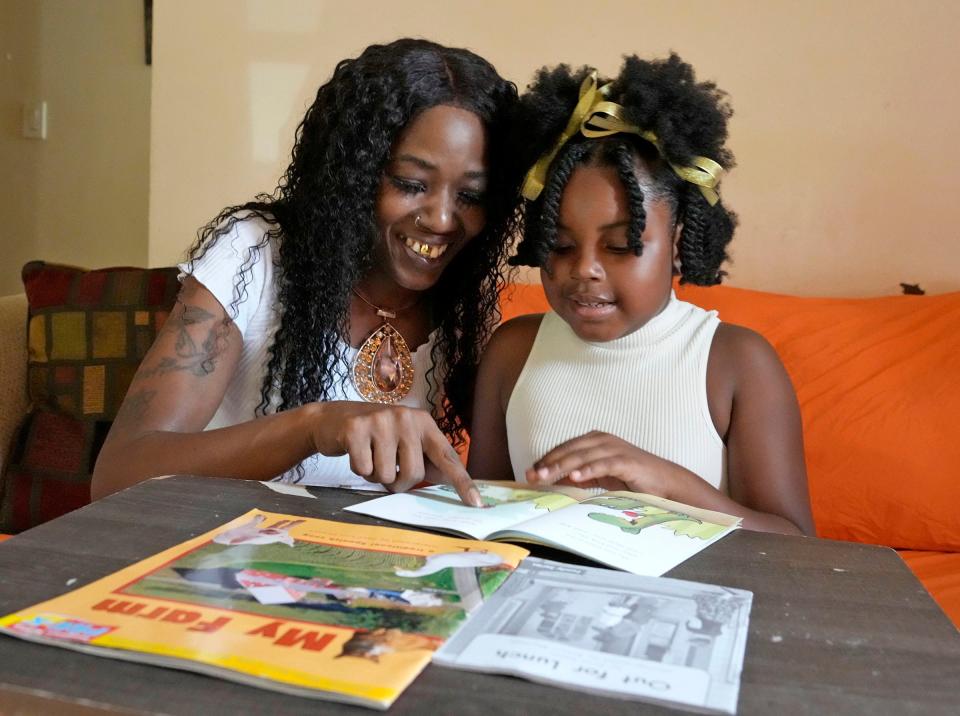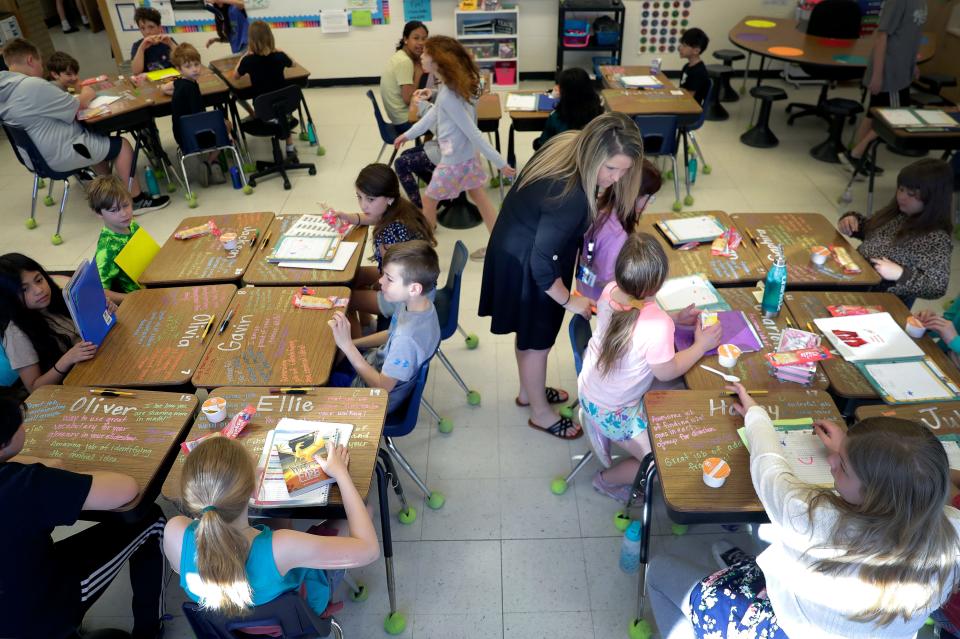Wisconsin passed a landmark literacy law 3 months ago. So what happens next?
Editor's note: With low reading proficiency scores across the state, USA TODAY NETWORK-Wisconsin is exploring the causes and consequences of low literacy. This article is part of the By the Book series, which examines reading curriculum, instructional methods and solutions in K-12 education to answer the questions: Why do so many Wisconsin kids struggle to read, and what can be done about it? To read other stories in the series, click here.
This story has been updated to clarify that school district's aren't required to use curriculums approved by the Early Literacy Curriculum Council but are incentivized to through grant funding.
After years of low scores, Wisconsin is following what 32 states have already done and overhauling the way it teaches students reading.
Act 20, the new state literacy law passed over the summer, has strict requirements for the Department of Public Instruction and school districts, with the goal of eradicating tactics that the legislation's authors say aren’t working.
But changing the way an education system teaches reading is more complex than simply switching curriculums or hiring more literacy-focused teachers. It also isn’t a fast process, despite the literacy law having swift timelines for change.
School districts must abandon some practices as early as next school year and provide their teachers with time-intensive training by 2025. While the clock is ticking, districts are in limbo waiting for the state's education department, the Wisconsin Department of Public Instruction, to approve a list of curriculums so districts can adopt new ones.

Many districts will give up old curriculums in favor of new ones selected by DPI
Wisconsin has over 400 public school districts, and at least 79% of school districts surveyed by the DPI in 2021 said they use curriculums that don't meet academic standards recommended by the department. This, in part, could help explain why Wisconsin reading scores have been low for years.
Starting in January, if a school district wants funding to adopt a new reading curriculum, it must be one approved by the department. As required by the literacy law, the DPI created an Early Literacy Curriculum Council that's tasked with developing a list of approved, science-backed curriculums.
Members of the council will start evaluating curriculums later this month. The full list isn't expected to be available until January.
The most aggressive provision of the law bars schools from teaching a reading technique called "three-cueing" in kindergarten through third grade starting in the 2024-25 school year.
Three-cueing is also known as MSV ("meaning, sentence structure and visual cues"). The technique is considered controversial because it places an emphasis on students using the meaning of the sentence or context, sentence structure and visual cues (the letters themselves) to decipher meaning from text instead of sounding out a word.
Research shows that this technique is used by poor readers, and that strong readers opt for sounding out words first.
Help us report: Fill out this quick survey and tell us about your experiences with reading in Wisconsin's education system.
Many of Wisconsin's school districts, including some of its largest, use curriculums that incorporate three-cueing. The technique rose to prominence throughout the country in the 1980s. Research starting in the '70s that continued through the '90s found this method wasn't effective and that phonics instruction was key.
Phonics instruction, in general, teaches students that letters make sounds, what those specific sounds are and how they combine to create words. While the scientific research gained traction nationally in the early 2000s, the three-cueing technique didn't disappear.
The literacy law's provisions leave districts that use the three-cueing method with less than a year to adopt new practices, train their staff and have it ready for next school year.
Jill Underly, the state superintendent and head of the DPI, told the USA TODAY NETWORK-Wisconsin she thinks the timelines are manageable for districts, but the legislation's effect on student performance won't be immediate.
"It takes three to five years, and so I think what I would stress ... (is) the understanding that it's going to take some time," she said.
Some districts in limbo, awaiting DPI decisions
The Green Bay School District, which uses a curriculum that incorporates three-cueing, is waiting for the literacy council and DPI to release its curriculum list before it buys new curriculum. It plans to select new reading curriculums for grades kindergarten through eight in March.
All reading materials for kindergarten through third grade that use three-cueing will be "considered obsolete and removed from classrooms in June," according to a memo from district administrators to the Green Bay School Board.
Green Bay, like Milwaukee and Appleton, has had low reading scores for years. Fewer than half of students at the state's five largest school districts are considered proficient in reading, according to state exam scores since 2018.
For the Appleton Area School District, the literacy law doesn't significantly affect the work the district's doing to change its instruction, according to Assistant Superintendent of Curriculum and Instruction Steve Harrison.
Last year, the district completed a reading program evaluation that showed the district needed to change or abandon certain instructional practices, he said. Appleton has been using instructional methods that incorporate three-cueing.
More: Most Appleton students aren't reading at grade level. Here's how the district plans to fix that
Appleton is piloting three phonics-focused instructional materials at its early grade levels with the goal of choosing a new curriculum by spring and implementing it next school year.
The district has been working to educate its teachers and administrators on the research behind how children learn to read, often referred to as the science of reading. In some cases, that means changing their perspectives on what reading instruction needs to look like.
"We're talking about something really big, very comprehensive, and something that is also changing the mindsets, potentially, of some of our educators and some of our community members at large," Harrison said.
It will be helpful to have the DPI's list of curriculums so that school districts statewide are on the same page, Harrison said.
Districts like Milwaukee Public Schools recognized the need to change before the state Legislature took up the issue of reading instruction.
More: The state capital of reading problems, Milwaukee Public Schools looks at how to turn things around
MPS is in its second year of using a new reading curriculum, which meets the academic expectations DPI recommends. Last summer, the district began training almost 300 teachers and school leaders in an approach to teaching literacy skills that are recommended by the literacy law.
Only 16% of students in Milwaukee Public Schools scored proficient in reading on last year's statewide standardized exams. That's up from 14% the previous year.
MPS also abandoned the three-cueing method, according to administrators at an August board meeting.
What will change with Wisconsin reading instruction?
Public schools and private schools participating in voucher programs are incentivized to purchase new curriculums that are preapproved by the DPI. Schools that do can have up to half of the cost reimbursed.
Wisconsin's new literacy law will also:
Establish the Wisconsin Reading Center, which will provide 64 literacy coaches to help advise reading instruction throughout schools;
Create the Council on Early Literacy Curricula which will annually recommend evidence-based reading curriculums for kindergarten through third grade;
Require schools adopting new reading curriculums after January 2024 to pick one recommended by the DPI, if they want reimbursement;
Bar the DPI from issuing teaching licenses to those who haven't learned how to teach reading using science-based techniques;
Require all K-3 teachers, their principals and reading specialists to receive specific professional development training on the science of how young students learn to read by January 2025;
Require assessments three times a year for grades kindergarten through three to measure student reading abilities with further testing for students who don't score well;
Require schools to implement individualized reading plans to catch up students who are not at grade level and create family notification plans to inform parents.
Laura Adams, the policy initiatives adviser for the DPI, said the agency is optimistic the literacy law will lead to positive changes in the state's reading instruction.
There are funding and resources to better support schools, but the changes are more of a pilot than a full program, she said.
The state has other systemic issues affecting student achievement, including social emotional learning, education workforce issues and child health, Adams said.

Not everyone in education is on board with the changes
While Gov. Tony Evers and the Department of Public Instruction came around to support the literacy law, key educational groups are not on board.
Two major groups — the Wisconsin Education Association Council and the Wisconsin State Reading Association — issued a joint statement denouncing the law when Evers signed it in July.
The reading association, a professional organization for teachers, hasn't changed its position. It doesn't like the law's instructional mandates or that only specific curriculums will be allowed, according to president Ryanne Deschane.
"Act 20 assumes that what works in one district will work in all districts without taking into consideration that children are not homogenous," she said.
Kathy Champeau, the reading association's legislative chair, said she would have liked to see a statewide study of what's causing the low reading scores and a slower process developing the law to include more teacher input.
The reading association also has concerns that the law prioritizes specific training vendors, Champeau said. The law requires districts to train staff in a professional development program created by the company Lexia Learning Services or one that meets specific criteria set out in the law.
Alan J. Borsuk contributed to this report. He is senior fellow in law and public policy at Marquette Law School. Reach him at alan.borsuk@marquette.edu.
Danielle DuClos is a Report for America corps member who covers K-12 education for the Green Bay Press-Gazette. Contact her at dduclos@gannett.com. Follow on Twitter @danielle_duclos. You can directly support her work with a tax-deductible donation at GreenBayPressGazette.com/RFA or by check made out to The GroundTruth Project with subject line Report for America Green Bay Press Gazette Campaign. Address: The GroundTruth Project, Lockbox Services, 9450 SW Gemini Drive, PMB 46837, Beaverton, Oregon 97008-7105
This article originally appeared on Green Bay Press-Gazette: Wisconsin passed a landmark literacy law 3 months ago. So now what?

